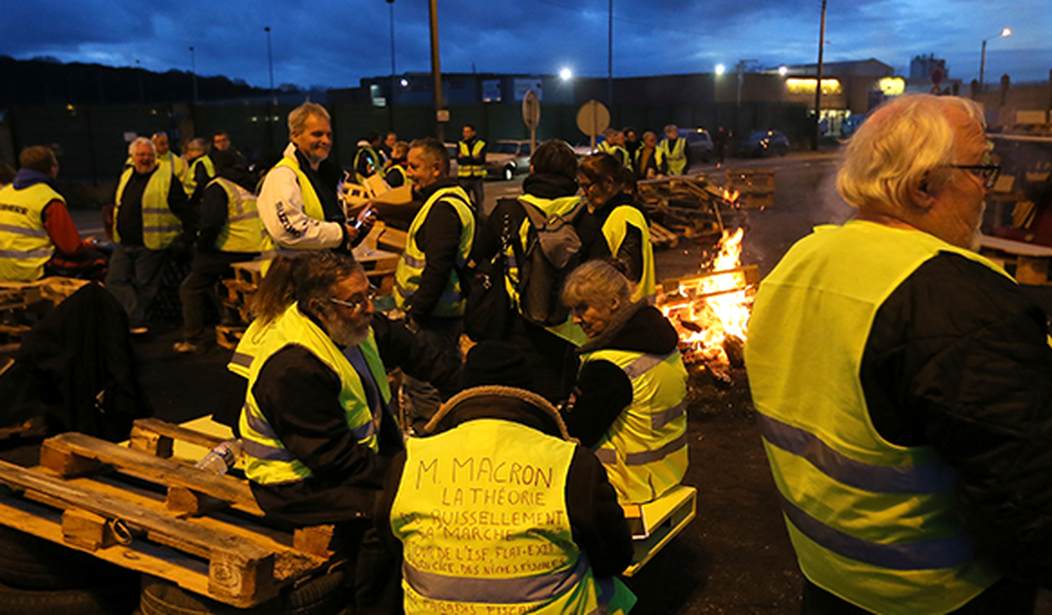While French President Emmanuel Macron was in Buenos Aires for the G-20 meeting, thousands of French, yellow-vested protesters were marching in the streets of Paris. As they marched, they were joined by anarchists from the left and right. The protest turned violent, property was defaced, cars burned and/or flipped over and world-renowned treasures were defaced.
It ended with three people dead, 260 wounded, more than 400 arrested and over $3 billion in damages.
Pictures the next morning showed holes in the road (from the burning vehicles), broken windows and graffiti on monuments. The image of the City of Light, one of the world's top tourist destinations, had darkened.
The protests started a few weeks ago, sparked by a fuel tax announced by Macron as part of his policy to curb diesel usage and invest in greener technology. The tax was to start next month. For French citizens living in rural areas, who tend to rely on cars and trucks to get around, this tax would be particularly painful.
And it comes at a difficult time. France's economic environment is anemic at best. Current economic growth is almost nonexistent; gross domestic product growth will end 2018 at around 1.6 percent. (The United States is running about twice that rate.)
French unemployment is over 9 percent, which has changed little since 1996. (The U.S. unemployment rate is less than 4 percent.)
Despite the low economic growth and high unemployment, taxes in France are still high. In addition to income tax, there is a 20 percent value-added tax on most goods and services. According to the Organisation for Economic Co-operation and Development's most recent report on government taxes, France came in the highest, at 46 -- 2 percent of the economy. The announcement of yet another tax burden was simply too much for many to bear. So they took to the streets.
Recommended
This was the third week of the protests. When the protests first started, Macron was adamant that the fuel tax would stay in place. Many Parisians took his initial response as a slap in the face, a sign that their leader was not concerned with the average French citizen. "Their response has poisoned the situation even more," said Olivier Depourtoux, a protestor from the French town of Gueret. Depourtoux was interviewed by Adam Nossiter of The New York Times for his piece this past week entitled, "Yellow Vests' Riot in Paris, but Their Anger Is Rooted Deep in France."
"The citizens have asked for lower taxes, and they're saying, 'Ecology," said Depourtoux in reference to the Macron's quest to meet international climate change targets.
In response to the protests, French Prime Minister Edouard Philippe announced this week that the fuel tax would be delayed for six months. He also acknowledged the protesters' anger and upset, noting, "No tax is worth putting in danger the unity of the nation."
The government's change in tax plans was greeted positively by U.S. President Donald Trump, who tweeted: "I am glad that my friend @EmmanuelMacron and the protestors in Paris have agreed with the conclusion I reached two years ago. The Paris Agreement is fatally flawed because it raises the price of energy for responsible countries while whitewashing some of the worst polluters in the world. I want clean air and clean water and have been making great strides in improving America's environment. But American taxpayers -- and American workers -- shouldn't pay to clean up others countries' pollution."
It is not clear how the French government will bridge the gap between not raising taxes and meeting the green standards that they have staked out.
On the other side of the pond, America works best when Americans are working, creating and contributing to and growing our economy. It's this economic engine that can sustain the world's strongest military, provide humanitarian aid and work to create technological innovations that can reshape our future. This is what Trump understands -- that we are fueled as a nation by the work of entrepreneurs. These entrepreneurs not only want to make money for themselves and their families, but also want to contribute to their communities and to a brighter future for our country.
As we Americans watched Paris engulfed in flames this past weekend, I hope we learned a lesson -- that raising fuel taxes for a global compact, which would create a drag on the economy and hardship for average citizens, will not work.

























Join the conversation as a VIP Member